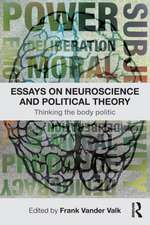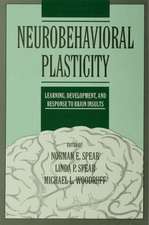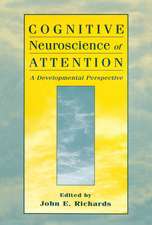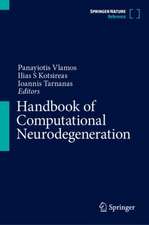The Neural Basis of Human Belief Systems: Contemporary Topics in Cognitive Neuroscience
Editat de Frank Krueger, Jordan Grafmanen Limba Engleză Paperback – 31 mai 2017
This book provides an interdisciplinary overview of what we currently know about the neural basis of human belief systems, and how different belief systems are implemented in the human brain. The chapters in this volume explain how the neural correlates of beliefs mediate a range of explicit and implicit behaviours ranging from moral decision making, to the practice of religion. Drawing inferences from philosophy, psychology, psychiatry, religion, and cognitive neuroscience, the book has important implications for understanding how different belief systems are implemented in the human brain, and outlines the directions which research on the cognitive neuroscience of beliefs should take in the future.
The Neural Basis of Human Belief Systems will be of great interest to researchers in the fields of psychology, philosophy, psychiatry, and cognitive neuroscience.
| Toate formatele și edițiile | Preț | Express |
|---|---|---|
| Paperback (1) | 299.52 lei 43-57 zile | |
| Taylor & Francis – 31 mai 2017 | 299.52 lei 43-57 zile | |
| Hardback (1) | 765.03 lei 43-57 zile | |
| Taylor & Francis – 9 iul 2012 | 765.03 lei 43-57 zile |
Preț: 299.52 lei
Preț vechi: 349.15 lei
-14% Nou
Puncte Express: 449
Preț estimativ în valută:
57.31€ • 59.99$ • 47.70£
57.31€ • 59.99$ • 47.70£
Carte tipărită la comandă
Livrare economică 31 martie-14 aprilie
Preluare comenzi: 021 569.72.76
Specificații
ISBN-13: 9781138109896
ISBN-10: 1138109894
Pagini: 264
Ilustrații: 12
Dimensiuni: 152 x 229 x 25 mm
Greutate: 0.45 kg
Ediția:1
Editura: Taylor & Francis
Colecția Psychology Press
Seria Contemporary Topics in Cognitive Neuroscience
Locul publicării:Oxford, United Kingdom
ISBN-10: 1138109894
Pagini: 264
Ilustrații: 12
Dimensiuni: 152 x 229 x 25 mm
Greutate: 0.45 kg
Ediția:1
Editura: Taylor & Francis
Colecția Psychology Press
Seria Contemporary Topics in Cognitive Neuroscience
Locul publicării:Oxford, United Kingdom
Cuprins
P.S. Churchland & P.M. Churchland What are Beliefs? R. Langdon & E. Connaughton The Neuropsychology of Belief Formation. R. Patterson & A.K. Barbey A Cognitive Neuroscience Framework for Causal Reasoning. E.B. Falk & M.D. Lieberman The Neural Bases of Attitudes, Evaluation, and Behavior Change. E. de Visser & F. Krueger Interpersonal Trust as a Dynamic Belief. R. de Oliveira-Souza, R. Zahn & J. Moll The Neural Bases of Moral Belief Systems. U. Wagner & H. Walter Neuroscientific Approaches to ‘Mens Rea’ Assessment. L. Moretti, I. Cristofori, G. Zamboni & A. Sirigu The Neural Structure of Political Belief. J. Bulbulia & U. Schjoedt, The Neural Basis of Religion. V. Bell & P.W. Halligan The Neural Basis of Abnormal Personal Belief. F. Krueger & J. Grafman I Believe to My Soul.
Notă biografică
Frank Krueger is Assistant Professor of Cognitive Neuroscience in the Molecular Neuroscience Department and the Department of Psychology at George Mason University. As the Chief of the Evolutionary Cognitive Neuroscience Laboratory and Co-Director of the Center for the Study of Neuroeconomics, Dr Krueger studies human social cognition and brain functions by applying structural and functional neuroimaging, neuropsychological testing, and molecular neurogenetics.
Jordan Grafman, PhD is Director of the Traumatic Brain Injury Research Laboratory at the Kessler Foundation in West Orange, New Jersey, USA. Dr Grafman conducts patient and neuroimaging studies to examine the functions of the human prefrontal cortex and the rules governing neuroplasticity in the human brain. He has a particular interest in the abilities that differentiate humans from other animals.
Jordan Grafman, PhD is Director of the Traumatic Brain Injury Research Laboratory at the Kessler Foundation in West Orange, New Jersey, USA. Dr Grafman conducts patient and neuroimaging studies to examine the functions of the human prefrontal cortex and the rules governing neuroplasticity in the human brain. He has a particular interest in the abilities that differentiate humans from other animals.
Descriere
Drawing inferences from philosophy, psychology, psychiatry, religion, and cognitive neuroscience, this volume provides an overview on how the neural correlates of beliefs mediate a range of behaviors and has important implications for understanding how different belief systems are implemented in the human brain.




















